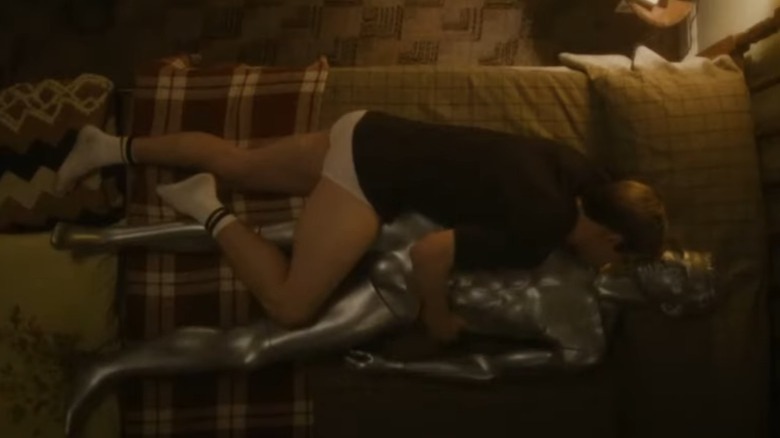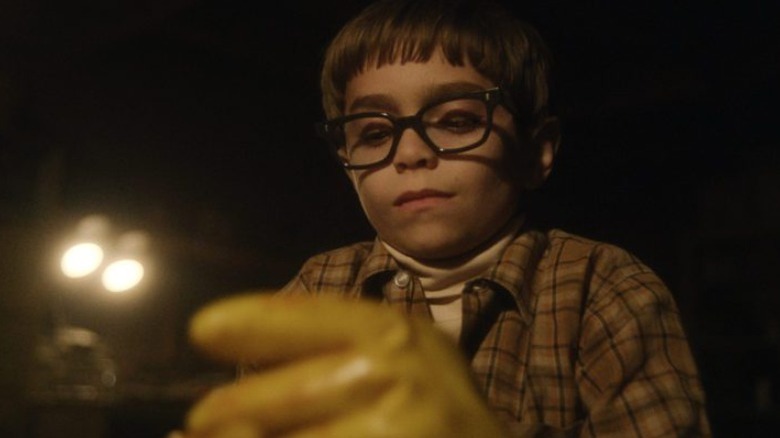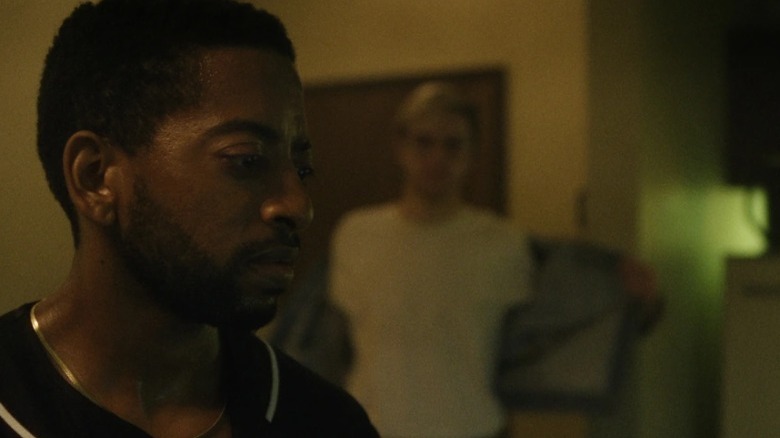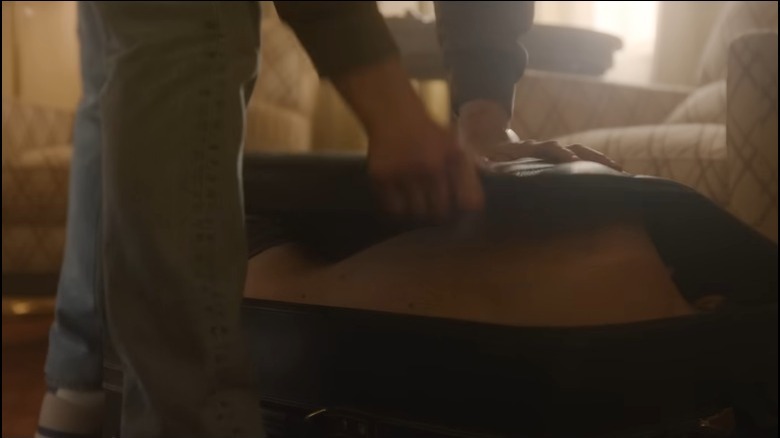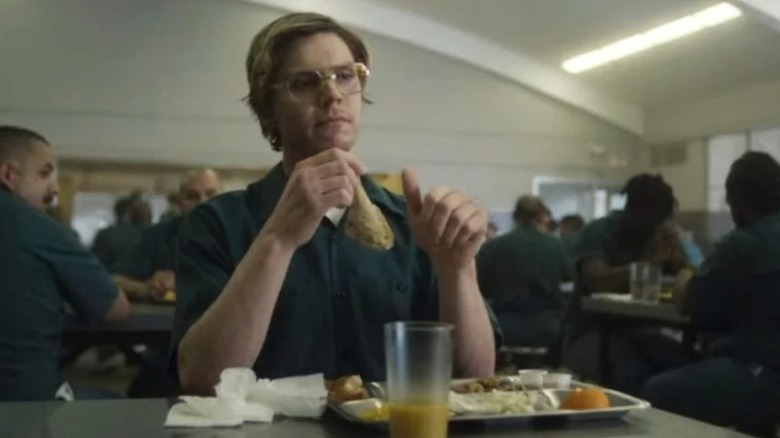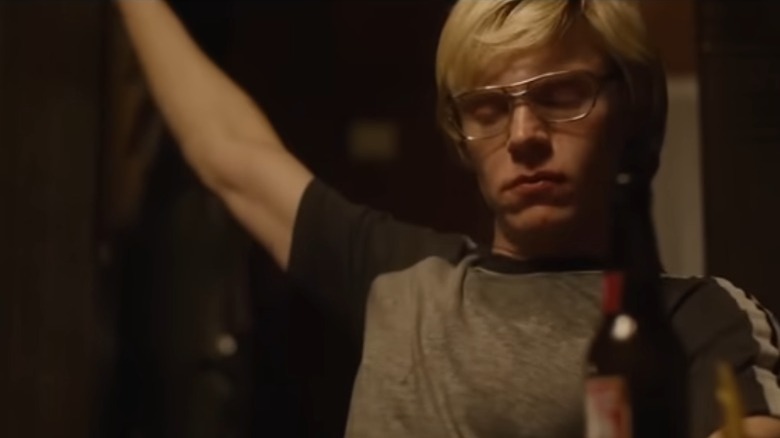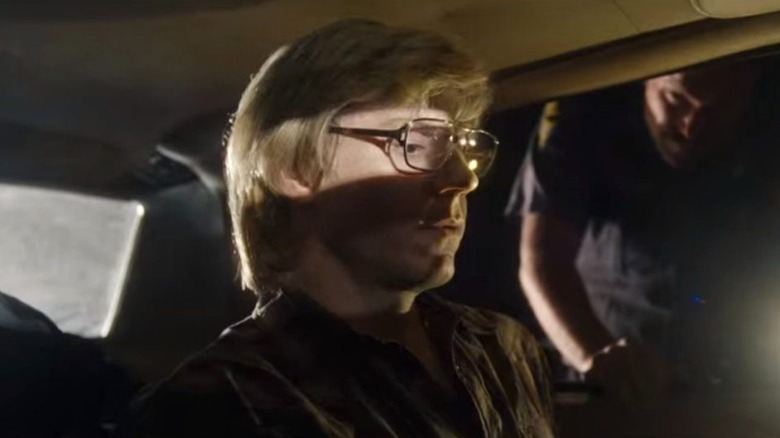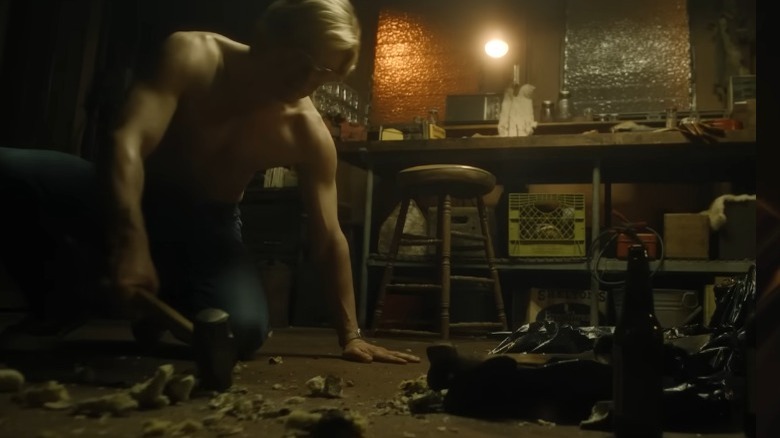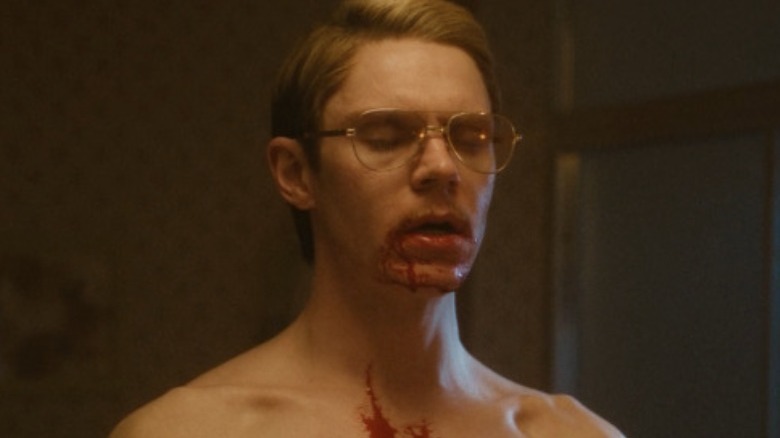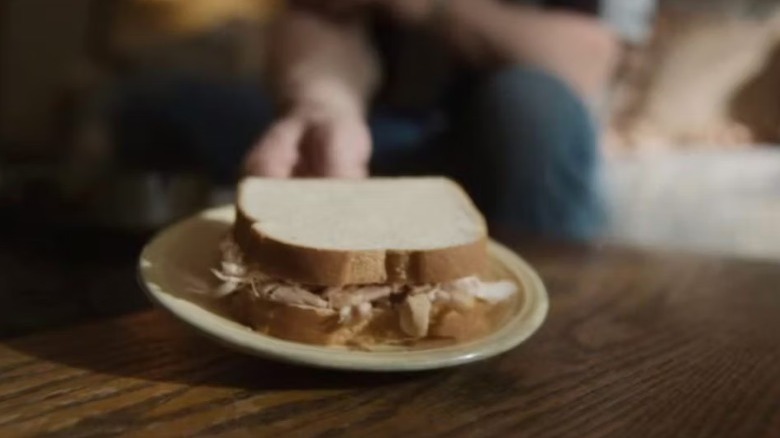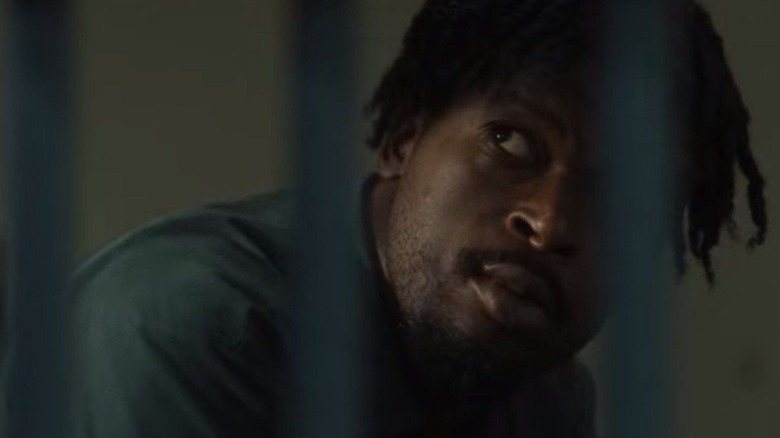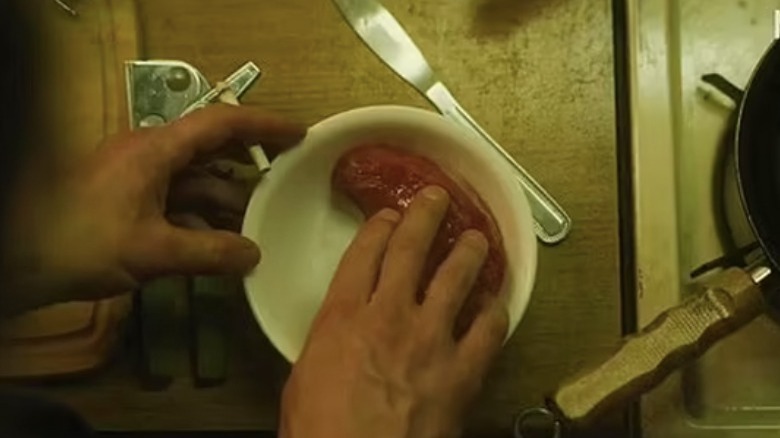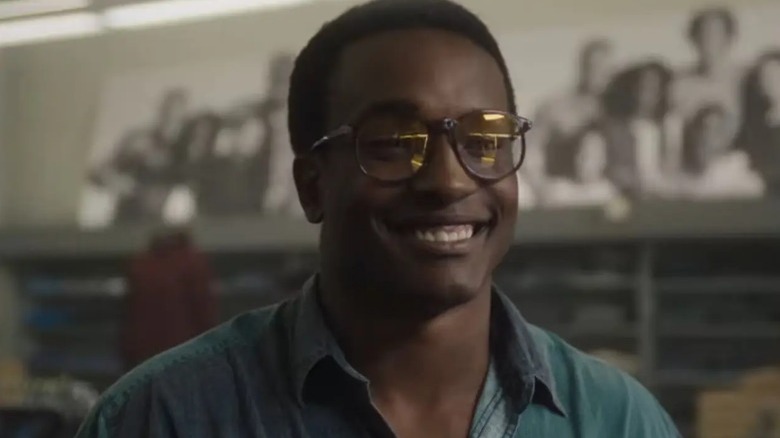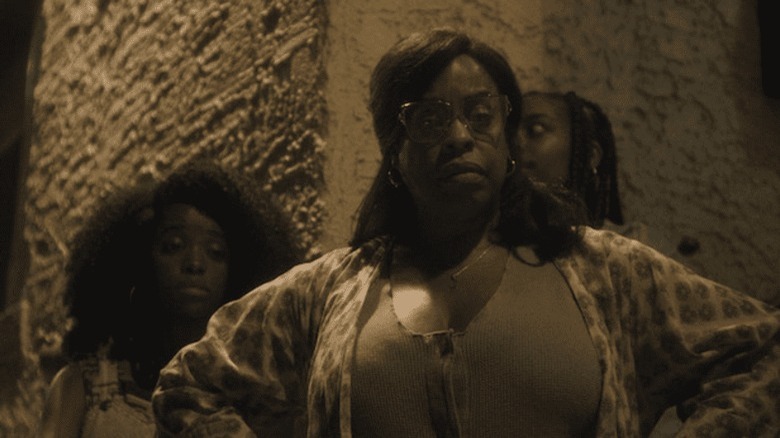Monster: The Jeffrey Dahmer Story Moments That Really Upset Viewers The Most
This article contains numerous mentions of sexual assault and extreme violence.
Considering the subject matter and the fact that "Dahmer — Monster: The Jeffrey Dahmer Story" comes from the mind of "American Horror Story" co-creator Ryan Murphy, it shouldn't be much of a surprise that it contains some pretty upsetting scenes. Starring Evan Peters as the titular serial killer, the Netflix limited series has been a big success for the streaming giant and demonstrated that true crime content is still very much in demand.
All of that success, though, doesn't mean that "Dahmer" is an easy watch. Many viewers will find the most disturbing moments in "Dahmer" offensive, gruesome, and just plain distressing to watch. Dahmer's troubling and audacious crimes are truly shocking and some of the worst parts of the true-life story may well be too uncomfortable for many people.
Murphy and co-creator Ian Brennan have provided a harrowing account of Dahmer's life and the way he terrorized his victims. These are the moments that are the most unsettling to see on television screens.
Jeffrey loses his mannequin
While living at his grandmother's home, Dahmer is shown to have stolen a metallic silver-colored mannequin. During one scene, he caresses and lies with the inanimate object and appears to service pleasure from its form. Dahmer's certainly not the first person to include a prop in his self-love routine, but he's clearly ashamed and goes out of his way to keep his mannequin out of sight, locked away in his bedroom.
When his grandmother goes into his room, she discovers the mannequin and throws it away after correctly suspecting its purpose. In a scene that's difficult to watch, Dahmer confronts his family member and flies into an utterly terrifying rage upon finding out what happened. He totally loses control of his temper, screams at his grandmother, and storms out, leaving viewers wondering whether he would actually harm the elderly woman or take out his frustration on someone else.
Dissecting roadkill and other animals
One of the few instances of Jeffrey Dahmer bonding with his father Lionel Dahmer (Richard Jenkins) in the series comes when the two take home and dissect a dead animal they find on the side of the road. This starts a morbid curiosity in the young killer, prompting him to go out and find more roadkill to experiment on. The show doesn't shy away from digging into the gruesome ways that Dahmer explores this hobby, showing how he would cut open carcasses and attempt to preserve bones. As if our skin needed more convincing to crawl, these scenes are fairly accurate representations of what Dahmer got up to in real life (via Pink News).
Seeing a younger Dahmer essentially begin to demonstrate his dark side is one of the hardest moments to watch in the series. It also poses questions about how his father attempted to foster his son's scientific mind but may have inadvertently awakened a sinister passion that would extend into Dahmer's adult life. Perhaps more worrying is the way that Dahmer killed the tadpoles he had originally gifted to his teacher by pouring oil into their jar, in an act that Seventeen notes actually happened.
The first glimpse of the severed head
The very first episode of "Dahmer" shows just how bizarre and downright horrifying Dahmer was. As he takes home his intended next victim Tracy Edwards (Shaun Brown), there is an ominous atmosphere. A brief glimpse into Dahmer's refrigerator as he opens it to take out soda shows that there is a decapitated head being chilled. This shot is immediately shocking and demonstrates exactly what type of show this is and how explicitly the terrible crimes will be reenacted.
According to the Associated Press, police found a variety of body parts in Dahmer's apartment after his crimes were discovered. Reports from the time state that up to three heads were found in his fridge among various other remains throughout the apartment. These included skulls and torsos hidden in the residence in various different locations such as closets and a filing cabinet.
The aftermath of Tuomi's murder
With Dahmer unable to use his usual method to drug and rape his victims, he is forced to take a different approach. During the fourth episode, "The Good Boy Box," Dahmer meets Steven Tuomi (Vince Hill-Bedford). Rather than going to his grandmother's house or a bathhouse — because he is banned from these establishments — he chooses to go to the Ambassador Hotel. The two drink and Dahmer accidentally drugs himself as well as Tuomi before the scene fades to black.
Dahmer awakes in bed the next morning with nothing initially seeming out of the ordinary. That feeling dissipates almost immediately as the shot pans over Tuomi's lifeless body. The man's chest has been severely beaten and is heavily bruised, showing the extreme violence that Dahmer must have used to kill his victim in a truly horrific way. Despite coming four episodes into the series, it is still a shocking moment and one that viewers will likely have gasped at when they saw the brutality of Dahmer's attack.
His humor in prison
After he is captured and his crimes are exposed, Dahmer shows two very different sides of himself. To the police and other authorities like the court, he is cooperative. He helps police identify victims and uncover everything he has done. In fact, he seems to understand what he has done is wrong and, although he doesn't exactly show any remorse, Dahmer does explain how he thought things progressed so quickly and the possible reasons for his behavior. Yet, things are very different in prison when he interacts with the other inmates.
According to the show, he's a very different type of person with the other prisoners. Rather than show any contrition, he instead makes light of the situation. He mentions the terrible things he did on the outside and pokes fun by shaping his food to resemble body parts to make it look like he's eating human flesh. It's a side to Dahmer that is never really seen up until this point and makes it look like this is all just a big joke to him.
Dahmer making fun of disabilities
"Dahmer" shows its titular bucket of excrement disguised as a person progressing through life in an attempt to examine how he became an infamous serial killing maniac. During his school days, he's not a particularly popular kid, struggles to make friends, and develops a reputation for being creepy due to his strange behavior and the fact that he tends to keep to himself.
One of the few times when the young Dahmer interacts with his classmates comes when he tries to be funny. He does this by mocking disabled people, mimicking them as if he himself has cerebral palsy and learning difficulties. A New York Post article confirms this is something that the real Dahmer did in school. The moment is hard to watch simply because of the way it is offensive towards those with disabilities, although it's worse coming from someone who is doing it solely to try to make others laugh or become more popular.
How he was almost caught multiple times
During the third episode, "Doin' A Dahmer," the serial murderer drinks heavily before trying to dispose of his latest victim. With body parts wrapped up in plastic garbage bags in his car, he is pulled over after swerving on the road. Yet, the police let him go with a warning. A later episode sees Ronald Flowers (Dyllón Burnside) report Dahmer to police after he is sexually assaulted, but the police dismiss his complaints.
In Episode 4, Dahmer begins to frequent bathhouses as a way of having privacy with the men he wants to drug and sexually assault. After he spikes the drinks of several potential victims, some of them require medical attention and Dahmer is permanently banned from bathhouses. However, little is done to reveal the danger he poses to the wider community and in what can only be another infuriating moment for viewers, the authorities are not informed.
Another equally chilling moment comes when he is speaking to his father and stepmother Shari (Molly Ringwald). During a conversation in a diner, Jeffrey Dahmer appears to come close to confessing what he has done and explaining exactly what type of person he really is. However, the pair brush away these concerns quickly before anything important is revealed, with Lionel Dahmer seemingly more worried about the sexuality of his son rather than the terrible things he is on the verge of admitting. If only Lionel or Shari had allowed the killer to open up more, then Jeffrey Dahmer could have been stopped much earlier.
If you or anyone you know has been a victim of sexual assault, help is available. Visit the Rape, Abuse & Incest National Network website or contact RAINN's National Helpline at 1-800-656-HOPE (4673).
How Dahmer disposed of body parts
Throughout the 10 episodes of "Dahmer," the main character is shown disposing of body parts in a variety of ways. After dismembering his victims, he dissolves the flesh in acid and tries to preserve some body parts, such as skeletons and skulls. Arguably the most harrowing moment of the series comes when he holds the skull of one of his victims.
Another moment sees Dahmer murder hitchhiker Steven Hicks (Cameron Cowperthwaite) and dispose of his body when he realizes that he has essentially gotten away with murder when no one comes looking for Hicks. Dahmer gleefully takes a hammer to the victim's bones to shatter them into tiny pieces he scatters outside his home and flushes fleshy remains down the toilet to get rid of them. This, once again, is an upsetting scene, especially as Dahmer appears to take pleasure in what he is doing.
Drinking stolen blood from the plasma donation facility
"The Good Boy Box" sees Dahmer go through a number of different jobs after he is expelled from college and discharged from the army. Lionel Dahmer genuinely wants his son to find work and overcome his alcohol addiction, so he sends Jeffrey Dahmer to live with his grandmother. While at his grandmother's house, Dahmer is eventually employed as a phlebotomist where he takes samples of blood from participants. Country Living reports that this was a role he genuinely held during his life.
His time at the Milwaukee Blood Plasma Center was not without incident, as viewers might have guessed from Dahmer's previous pattern of being unable to keep a steady job. Before long, the murderer begins to steal bags of blood from the facility. It soon becomes clear exactly why he is doing this when he empties the bags over his head and body and even drinks some of the blood. It's a disquieting sight and one that doesn't involve a direct victim but is still unnerving.
The meat sandwich scene
When Glenda Cleveland (Niecy Nash) is eventually successful in her attempt to force the landlord to remove Dahmer from the building, the killer comes to her apartment in a moment that will likely send chills down the spines of everyone watching. As he menacingly enters her home while maintaining a calm facade, he offers her a sandwich that contains unknown meat that he is desperate for Cleveland to consume.
The scene, which according to The Lab is based on a true story, is completely unnerving as Dahmer becomes evasive whenever he's asked what the sandwich is made of. The show doesn't actually reveal the nature of the meat, but it's heavily implied to be human remains. Fortunately, Cleveland is unwilling to eat the sandwich and knows that something is wrong. The tension during this scene is practically unbearable as the two face off for the final time.
Jeffrey Dahmer's murder at the end of the series
There will be many viewers who believe that Dahmer gets exactly what he deserves in the final episode of the show. The merciless killer is imprisoned for his crimes and expresses a desire to be killed for what he has done multiple times, even though there is no death penalty available for the judge to hand down in Wisconsin. But his wish is finally granted by another inmate who murders Dahmer and another prisoner.
Dahmer, who has supposedly turned to religion by the time of his death, refuses to fight back or try to persuade his killer, Christopher Scarver (Furly Mac), to spare his life. He simply stands still while Scarver beats him over the head with a piece of gym equipment he smuggles into their work detail where no guards are present. The graphic way that Dahmer is killed and the way that "Dahmer" shows every strike hitting the serial killer leaves a lasting impression on viewers and will certainly cause some revulsion despite everything that Dahmer had done.
Cooking and eating human flesh
One of the most deranged things about Dahmer compared to other serial killers is that he was a cannibal who had a history of eating human flesh. According to History.com, police found clear evidence that he had consumed body parts of his victims when they searched his apartment. The series mirrors this horrific aspect of the Dahmer story closely, as Dahmer cooks and eats human remains in multiple scenes.
While such actions are hard enough to watch and will obviously be troubling for many of those watching, what makes matters even more distressing is the casual way that Dahmer prepares his grisly meals. At one point, he cooks what appears to be a human heart in a frying pan with oil before he eats it while sitting at his table with a knife and fork as if it is a normal meal. It's profoundly unpleasant.
Tony's death
Episode 6, "Silenced," is perhaps the most heartbreaking of the entire series and undoubtedly one of the most upsetting. The episode opens by introducing the audience to Tony Hughes (Rodney Burford), a deaf gay man who moves away from his home after one of his close friends is killed. Although he is attending a university and has a job, he returns to his hometown to visit family and meets Dahmer in a bar.
Almost immediately, viewers will know that something awful is going to happen due to the way the writers clearly want to get you invested in this person. However, Dahmer chooses not to kill Hughes — at least not initially. The two begin a sort of relationship, although it's unclear exactly how accurate this is compared to what happened in real life (via Esquire).
Like most of Dahmer's other victims, though, Hughes is eventually killed when he tries to leave to go to work. This appears to set off a fear reaction in Dahmer that those he loves will leave him permanently, and he murders Hughes with a hammer. The death is all the more tragic in "Dahmer — Monster: The Jeffrey Dahmer Story" because we get to see so much of the likable and friendly Hughes.
An injured and drugged Konerak Sinthasomphone returned to Dahmer
This moment is particularly difficult to watch simply because of the way that Dahmer is able to get the young Konerak Sinthasomphone (Kieran Tamondong) back into his home after the 14-year-old manages to escape despite being drugged and tortured. The police believe Dahmer's story about the pair being in a relationship and that the underage child is simply drunk. He is murdered shortly after this event in a way that could so easily have been prevented.
What makes this whole ordeal that much worse is that Dahmer could have been caught much earlier than he was, saving the lives of several victims. The two police officers, John Balcerzak (Scott Michael Morgan) and Joseph Gabrish (Matthew Alan), ignored the protests of the woman who had found Sinthasomphone and allowed Dahmer to take him back to his apartment with only the most cursory investigation (via Snopes). Not only was this an obscene case of negligence but these police officers were later reinstated and are even given an award in the show. According to Bustle, Balcerzak would later go on to become the president of the Milwaukee Police Union.

